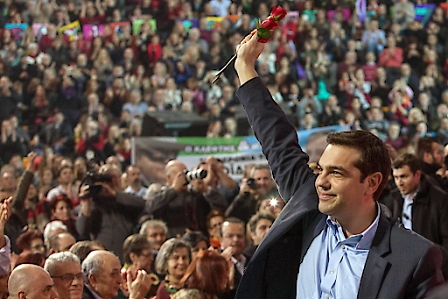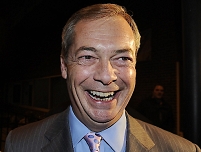Erstellt am: 21. 1. 2015 - 15:09 Uhr
"The end of politics as we know it"
This year, there will be at least 10 general elections in European countries. That is to say, 10 are planned at the moment. Of course, there may be more if and when governments fall and snap elections are held.

EPA/SOTIRIS BARBAROUSIS
Greece kicks off this voting bonanza on Sunday, in an election which is likely to see the populist Syriza party take the largest share of the votes. As they are promising to renegotiate the EU bailout, that will make for some interesting shuffling around on the political stage.

EPA/FACUNDO ARRIZABALAGA
All eyes are also on the UK - which will vote in early May, or maybe a little sooner - and there the right wing populist party, UKIP, is threatening to upset the balance of power.
All over Europe, populist parties are garnering more and more support, and according to the Economist Intelligence Unit, it heralds the end of politics as we know it.
Plus ça change
Since the end of WW2, the European political landscape has been dominated by large centre left and centre right parties, and/or coalitions involving centrist blocks. The result has been stagnation, and an increasingly wide gulf opening up between the political elites of those established parties and the voters.
Political party membership is plummeting as successive governments in different countries prove over and over again that whichever party you vote for, you end up with much the same in terms of government. Some voters are giving up and staying at home, others are switching to the populist parties who are at least showing an interests in the concerns of the voters, and even coming up with some policies to address them.
Real change in the wind
How all this plays out if and when the populist parties get into power remains to be seen, but Joan Hoey of the Economist Intelligence Unit is convinced that after 2015, the European political landscape will be changed forever.
Dieses Element ist nicht mehr verfügbar
Also on today's Reality Check:
State of the Union address
Political commentator Steven Hill gives his analysis of last nights "State of the Union" address by President Obama.
Dieses Element ist nicht mehr verfügbar
The rise and rise of Boko Haram
Why Boko Haram appears to be growing and growing, and facing very little opposition.
Dieses Element ist nicht mehr verfügbar
The death of a prosecutor
Argentina analyst, Roberto Herscher, explains why the suspicious death of a prosecutor is bringing Argentines onto the streets to protest against a corrupt government and legal system.
Dieses Element ist nicht mehr verfügbar
How North Korea inspired 1000+ coffees
Matt Kulezsa discovered an unexpected and lighthearted side to North Korea
Matt Kulesza talks to Johnny Bliss about how a trip to North Korea inspired his mission to meet all his over 1,000 Facebook friends face to face for a coffee.
Dieses Element ist nicht mehr verfügbar
FM4 Reality Check
Monday to Friday from 12.00 to 14.00, and after the show via Podcast or fm4.orf.at/realitycheck.


